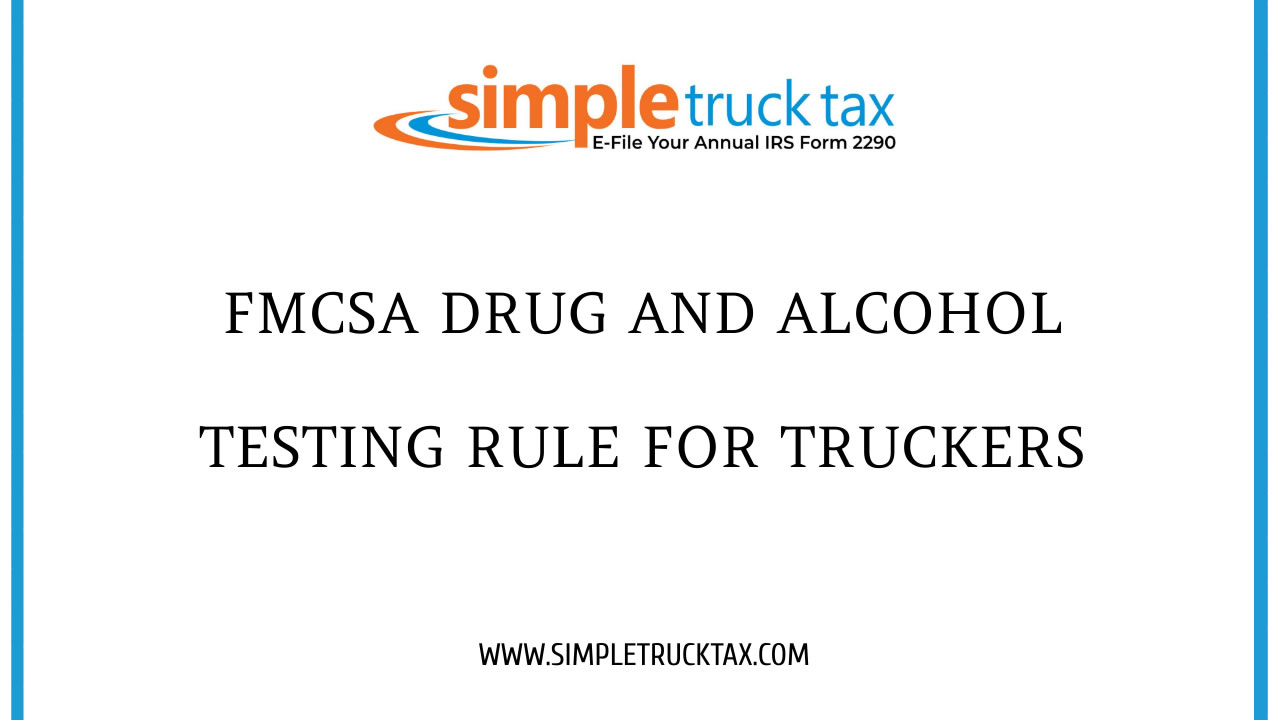
FMCSA drug and alcohol testing rule for truckers
The Federal Motor Carrier Safety Administration, FMCSA, has strict rules regarding drug and alcohol testing for truck drivers to protect not only the life of the driver but also members of the general public. Both trucking companies and drivers should be aware of such rules. The following is a general overview of the FMCSA drug and alcohol testing requirements for truckers.
1. Who Is Subject to Testing?
FMCSA's drug and alcohol testing rules cover all CMV drivers who operate vehicles that:
- Weight over 26,001 pounds
- Transport hazardous materials
- Carry 16 or more passengers
2. Types of Required Tests
FMCSA requires several types of drug and alcohol testing of the CMV drivers. The tests include:
- Pre-Employment Testing: The drivers have to undergo pre-employment testing before getting hired in a company for driving or using a commercial vehicle.
- Random Testing: Drivers can be taken for unannounced random tests for drugs and alcohol during the year. It is one of the most critical deterrents against the use of drugs or alcohol.
- Post-Accident Testing: Drivers involved in accidents where a fatality occurs, or the driver is cited as at fault, are compelled to take tests within a specified timeline.
- Reasonable Suspicion Testing: If an employer reasonably believes a driver is under the influence of drugs or alcohol due to observed behavior, they may require a test.
- Return-to-Duty Testing: A driver who has received a verified positive test result must be given the opportunity for a return-to-duty drug and/or alcohol test before returning to a safety-sensitive function.
- Follow-Up Testing: Any driver found to have violated the prohibited drug and alcohol rule must be subject to unannounced follow-up testing for up to 5 years.
3. Substances Tested For
FMCSA tests for a standard panel of substances to detect recent drug and alcohol use. Among the drugs tested for include:
- Marijuana
- Cocaine
- Amphetamines
- Opiates
- Phencyclidine
4. Consequences of Failing a Test
In case a truck driver fails a drug or alcohol test, strict action will be taken against him/her. If a driver tests positive or refuses to take a test, he/she:
- Will be removed from safety-sensitive duties-operating a CMV-immediately.
- Return-to-duty process with education, counseling, and follow-up testing must be completed by drivers. A record of violation is kept in FMCSA's Drug and Alcohol Clearinghouse, making driver employment quite difficult by other carriers.
5. FMCSA Drug and Alcohol Clearinghouse
FMCSA's Drug and Alcohol Clearinghouse: It is an online repository that stores records of violations of drug and alcohol testing by drivers. Employers refer to this database if a driver failed his drug or alcohol test before hiring him. Employers are mandatorily required to refer to the Clearinghouse for hiring a new driver from January 2020.
6. Employer Responsibilities
It becomes the trucking company's responsibility to ensure their drivers are in compliance with FMCSA's rules about drug and alcohol testing. Employers are required to:
- Establish and maintain a drug and alcohol testing program
- Provide pre-employment, random, and post-accident testing if required
- Maintain records of all test results and violations
Failure to comply with any of the above could result in a penalty being imposed on the employer and also affect the safety record of the company.
FMCSA's drug and alcohol testing regulations will be part and parcel of the trucking industry to keep the roads safe. These rules are going to be obliged upon trucking companies and drivers for not getting into any kind of legal complications and to provide a safe working atmosphere. Thus, it would be crystal clear from the understanding and following of the requirements regarding testing to keep the drivers and public safe.
Note: For more information, visit IRS website